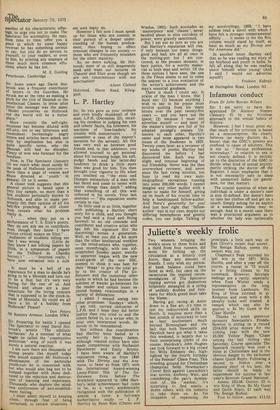L. P. Hartley
Sir, So you gave us your intimate and even kindly thumbnail of the man, L.P.H. (December 23), recalling his candour in judging his own and others' faults, his tolerance, his wariness of 'free-loaders,' his trouble with menservants . . . (I remember a case of the master's devotion for the servant). All this was very well as between good friends and, in that ambience, you allowed yourself to get personal about his increasing bulge, his soft, pudgy hands and his latter-day tendency to drink a little more than was good for him. You then brought your vignette to life when you touched on "the stoic and Olympic melancholy of a man who has faced and come to terms with worse things than death" adding that something of all this was reflected in his novels. Your last sentence — "His reputation seems certain to rise."
So little said in so little, together with publishing a Hartley short story for a child, and you thought you had said a fond and fitting farewell to an old comrade and Windus, 1963). Such accolades as ' masterpiece' and ' classic ', never bandied about in elite corridors of power, were gravely sanctioned.
But I am not as sure as you are that Hartley's reputation will rise, if only because too many things, good and bad, are all at once in the melting-pot: but I am concerned, at the present moment, in bare justice, for a worthy memorial to both man and writer. Of the three notices I have seen, the one in the Times seems to me to come the nearest to a true evaluation of the writer's achievement and the man's essential goodness.
There is much I could say, in praise of the man I know, that I must not: (1) because anything I wish to say in his praise must involve quoting from his many letters over the past twenty-five years — and you have not the space; (2) because I must not advertise myself — and most of the master's letters are full of his adopted proteges praises. Unknown to each other, Hartley's name and mine appeared in two issues of the Bookman in 1925. Twenty years later, as a reviewer of my books of poems, Hartley had discovered me before I had discovered him. Such was the slight and tenuous beginning of our friendship. Never was the then overworked reviewer, and never since the fast rising novelist, too busy to read my own autobiographical recreations running into some 200,000 words. I cannot imagine any other author with a name to make for himself, giving up so much of his crucial time to help a handicapped fellow-author.
And there's generosity for you! And just how right that ' fellow
author ' was in our case, despite our differing hemispheres and genetic codes, you can judge. Talking of
my novel-trilogy, 1959: "I have seldom read a novel with which I have felt a stronger temperamental affinity . . . it seems to me the first volume would stand by itself, as least as much as my Shrimp and the Anemone did" . . .
In another letter Hartley said that as he was reading my story of my boyhood and youth in India, he felt all along that he was reading about himself when young! (And I said I would not advertise myself!) Fredoon Kabrah 48 Hutingdon Road, London N2


































 Previous page
Previous page